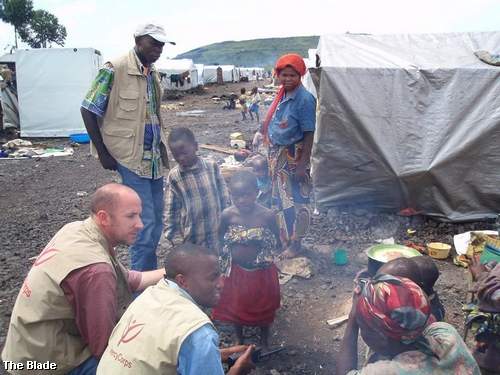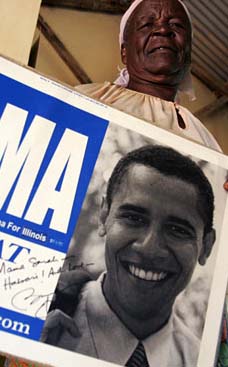
Each morning when Luke King wakes up in the Democratic Republic of Congo, he flips the light switch to see if the electricity works. Then it's off to the shower to see if there is running water. "That kind of sets the tone for the day," the 33-year-old Toledo native said. The next step for Mr. King, a 1994 graduate of Start High School and former French teacher at Waite High School, is to the daily security briefing to determine the level of humanitarian aid he and his staff will be able to provide that day to thousands in eastern Congo - people who are being displaced by the volatile conflict between rebel groups and the Congolese military. As a country director for Mercy Corps, an international charitable organization that offers aid and emergency relief services to areas in need, security is a chief concern. And the needs are vast. "They are living literally at the edge of survival," Mr. King said in an interview from his cell phone after a day working in a displacement camp near the front lines of the heated conflict. Mr. King has lived in the central African nation since 2005 - but over the past few months, he says the situation has become drastically worse.
Madagascar RPCV Luke King is head of Mercy Corps in Democratic Republic of Congo
Ex-Toledoan lends helping hand in Congo
Aid delivered as volatile conflict rages
By JAMES JOYCE III
BLADE STAFF WRITER
Caption: Luke King, left, consults with residents of a displacement camp in the conflict-ridden Democratic Republic of Congo. Photo: Phil Oldham
Each morning when Luke King wakes up in the Democratic Republic of Congo, he flips the light switch to see if the electricity works. Then it's off to the shower to see if there is running water.
"That kind of sets the tone for the day," the 33-year-old Toledo native said.
The next step for Mr. King, a 1994 graduate of Start High School and former French teacher at Waite High School, is to the daily security briefing to determine the level of humanitarian aid he and his staff will be able to provide that day to thousands in eastern Congo - people who are being displaced by the volatile conflict between rebel groups and the Congolese military.
As a country director for Mercy Corps, an international charitable organization that offers aid and emergency relief services to areas in need, security is a chief concern.
And the needs are vast.
"They are living literally at the edge of survival," Mr. King said in an interview from his cell phone after a day working in a displacement camp near the front lines of the heated conflict.
Mr. King has lived in the central African nation since 2005 - but over the past few months, he says the situation has become drastically worse.
Since the end of August, fighting between government forces and rebel groups led by Gen. Laurent Nkunda has displaced more than 250,000 people, adding to those who already had been driven from their homes by previous violence.
The situation is being called one of the world's most dire humanitarian crises.
Last week, the United Nations agreed to send an additional 3,100 peacekeepers to the region, bolstering the 17,000 troops already there. Mr. King is one of 17 American aid workers in the conflict-ridden province.
"There is nothing there to support them," Mr. King said. "To be honest, they are desperate."
That's where Mr. King and his staff of 45 people - 40 of them are Congolese - come into play.
Each day they deliver 158,578 gallons of clean water to displacement camps and remote communities. Many of the camps for internally displaced people - they are not refugees, Mr. King said - are the same ones used during the genocide in Rwanda in 1994, when it's estimated that as many as 1 million Tutsi civilians were killed.
A 'dramatic' setting
Over the past decade, tensions between ethnic groups in Rwanda have spilled over that country's western border into eastern Congo, fueling the first and second Congo wars.
The two countries also share parts of Lake Kivu at the Congolese provincial capital of Goma, a point of contention in the most recent violence. The region also is situated near the crater of the active Nyiragongo volcano. The last eruption was in 2002.
"I can see an active volcano glowing red right now," Mr. King said, before explaining the sound of a deep rumble in the background as a passing vehicle. "It's a pretty dramatic environment."
Mr. King fully understands the dangers of his work, but that takes a back seat to his passion to help the people who are at direct risk.
"I have seen violence directly, I have been caught up in the midst of firefights as we carry out our daily work," Mr. King said with slight hesitation in his voice.
"One of the uncertain things about working in the [Democratic Republic of Congo], you never know when you will get caught up in a fire zone."
Still, the risk is worth the reward for the native Toledoan.
A winding path
After graduating from Start, Mr. King went to Ohio State University, where he received a bachelor of arts degree in English and premedicine.
From there, he did a stint in the Peace Corps, serving in Madagascar. That's when he "fell in love with the continent of Africa," he said.
But he believed he could be more effective if he had additional skills, so he decided to go back to school.
First he was a long-term substitute French teacher at Waite for two years and then he went back to school to receive a master's degree in public health from the University of Michigan.
Mr. King did research in Durban, South Africa, as a graduate student, and that led to a job with Catholic Relief Services in the Democratic Republic of Congo before joining Mercy Corps in February.
"It's one of those places where people don't stick around too long," he said.
That's mostly because of burnout, and it's difficult to strike a balance with the things seen by a relief worker in the conflict-ridden zone.
When he hears of people's family members being raped or innocent victims being killed or disappearing in the forest, Mr. King said it can be hard to maintain balance and stay fresh.
Part of the way he deals with that is to keep things in perspective: "You're not going to change everything today," he recites as if it's not his first time.
Another thing to help him cope with his daily environment is to maintain some hobbies, including writing a screen play.
On the homefront
Each morning, Mr. King's mother, Charisse Folger, starts her day by flipping on the computer to see what is happening in Congo.
Her next step is to look at her e-mail to see whether Luke has sent anything.
One morning in early September was particularly unnerving for Mrs. Folger.
On the first stage of her morning routine, she learned that 15 aid workers had died in a plane crash near the Rwandan border.
"It was four hours before we heard from him to learn that he was OK," she said.
Since 1977, the U.S. State Department has repeatedly issued travel advisories about Congo, formerly Zaire. The recent conflict caused the State Department to issue restrictions on travel within the country by U.S. officials. On Oct. 29, it called for all government personnel who had been present in Goma to temporarily relocate to the Rwandan town of Gisenyi, directly across the border. That restriction was lifted in part a few days later, but access was permitted only during daylight hours.
"Armed groups as well as active-duty and demobilized Congolese troops in parts of the country are known to pillage, carjack, and steal vehicles, kill extra-judicially, rape, kidnap, and carry out military or paramilitary operations .•.•. Travelers are frequently detained and questioned by poorly disciplined security forces at numerous roadblocks and border crossings throughout the country," according to the latest travel warning.
Although there is constant worry for Mrs. Folger, Luke's father, Jeff King, and their other three children, the family seems to understand his drive to serve.
"We say a lot of prayers for him and hopefully he can really help those people out and help the Congo out so they can become a more civilized country," the elder Mr. King said.
And that is how Luke King views the value of his work.
A sense of pride
He is prideful when he speaks of the fuel-efficient stoves he helps distribute to the Congolese people and his efforts to teach them how to maintain small gardens outside of their homes. Without these things, members of the mostly agrarian society, specifically the women, would have to venture into the forest to collect firewood and into crop fields for food, both activities that put them at risk of physical assault.
"It creates a significant risk to their well-being," he said. "We work with the [displacement camps] to develop strategies to enable them to have some sort of control over their lives."
Now, because of the fighting, the region is almost completely dependent on the humanitarian community to provide them with the basic needs.
Even the displacement camps are vulnerable. Mr. King said there are armed groups that rely on the already depleted population for what they need, such as food and water.
"They are not above walking into a [displacement] camp after we have distributed food and water," he said.
Even when Mr. King makes the trip back to Toledo to visit family, after about a week Mrs. Folger said she can sense that her son gets a bit antsy to return and lend his helping hand.
"When you're here, you really feel the pulse or heartbeat that I don't think I'd feel somewhere else," Mr. King said of his work in Congo.
The mission ahead
Over the next month, Mr. King will help to relocate 65,000 displaced people from a camp called Kibati, which is six miles north of Goma.
Kibati had been situated between the front lines of the fighting before rebel forces began to pull back early last week at the urging of U.N. peacekeeping negotiations. The camp's population grew from about 8,000 in mid-October to its current 65,000-plus.
Luke King's sister, Adrian Meier, is a first-year college counselor at Notre Dame Academy in Toledo. When she started the school year, two teachers who had been discussing an awareness campaign about the atrocities in Congo discovered her link to the region and asked her to help raise awareness.
So over the next few weeks, the educators will try to promote interest among students and staff members with a goal of raising funds to help the cause.
Mrs. Meier is also curious if there is something more that can be done beyond just raising cash.
"Just trying to have our students think globally, instead of just locally or nationally," she said.
Contact James Joyce III at:
jjoyce@theblade.com
or 419-724-6076.













